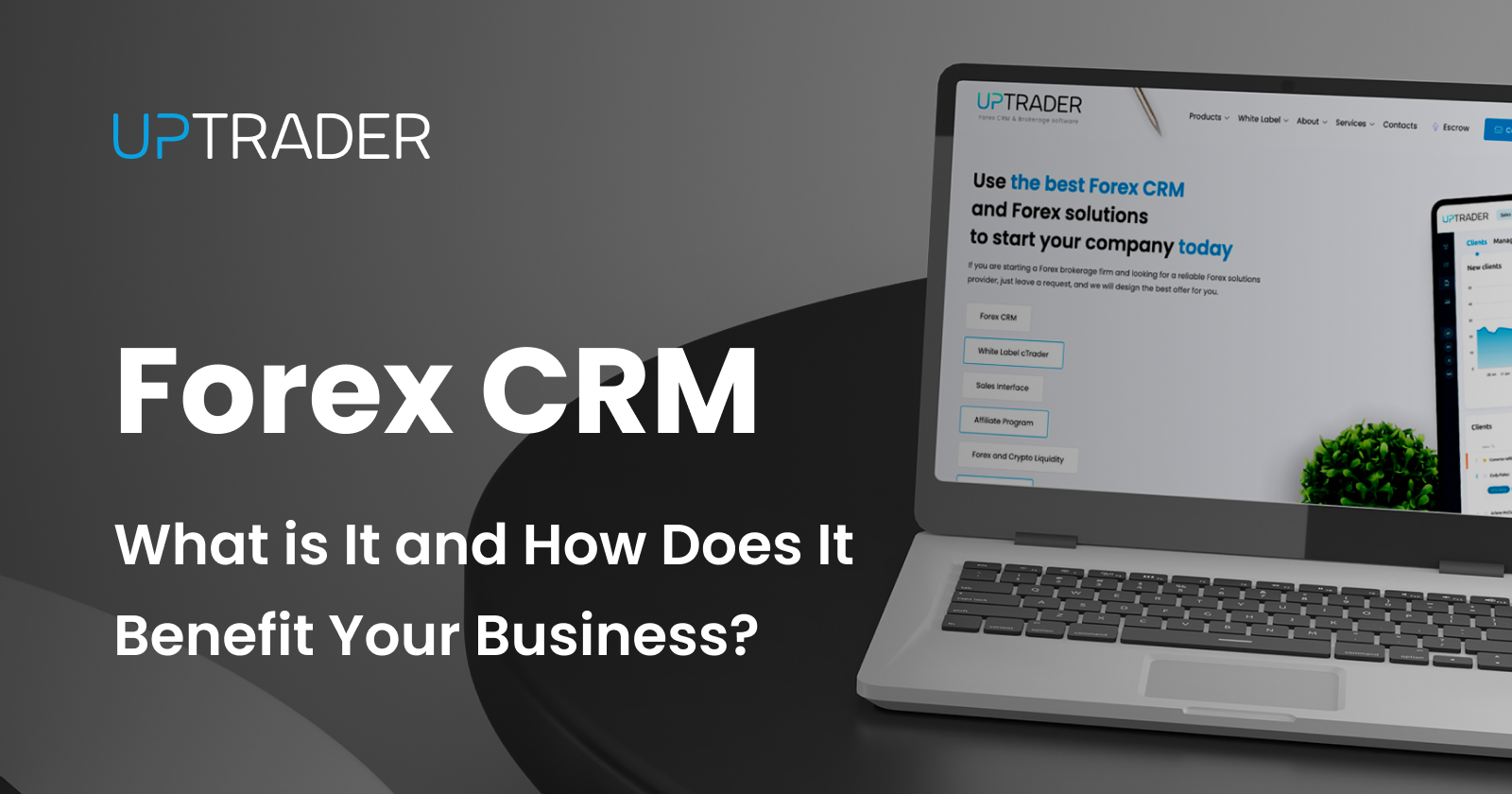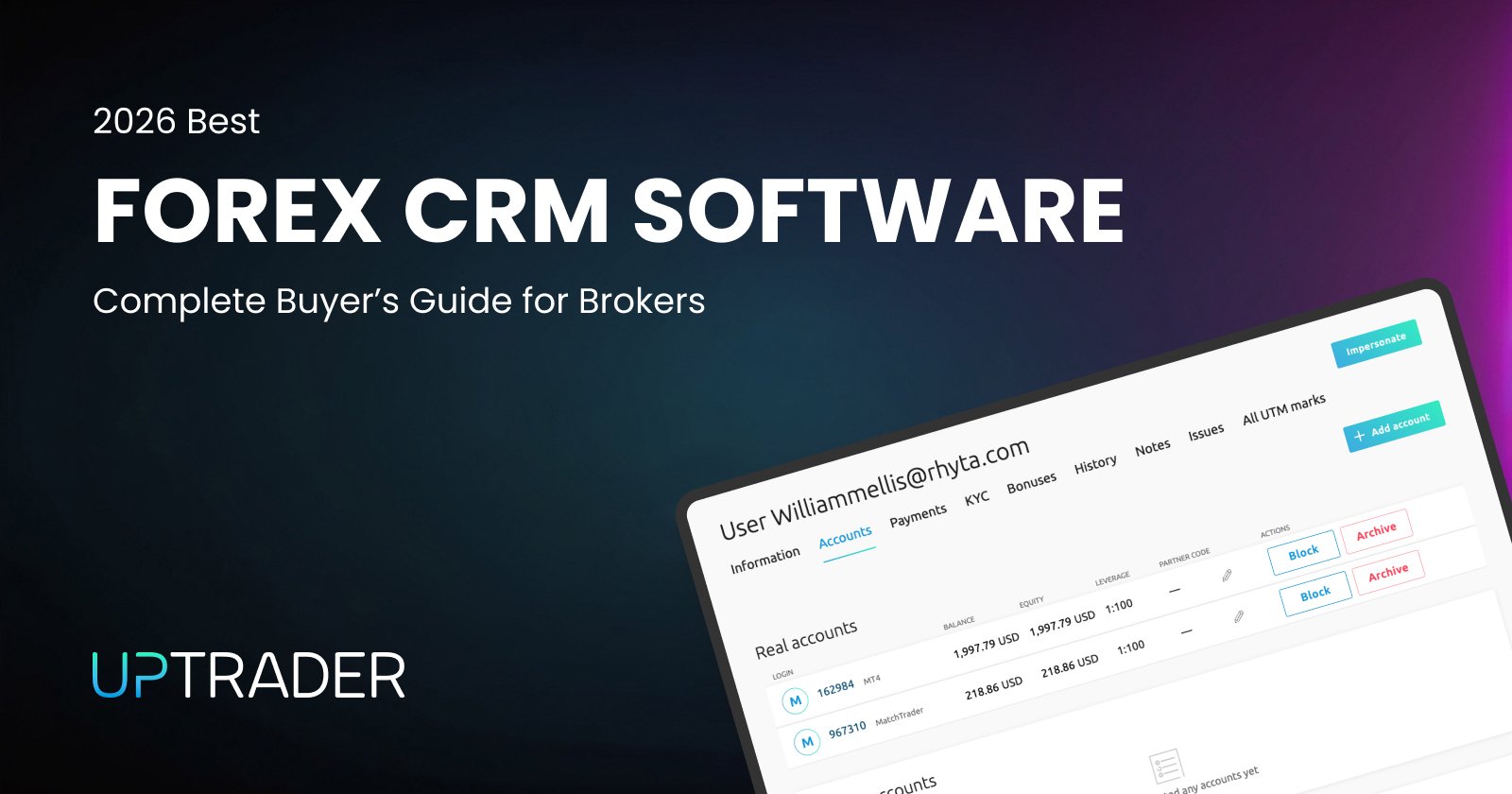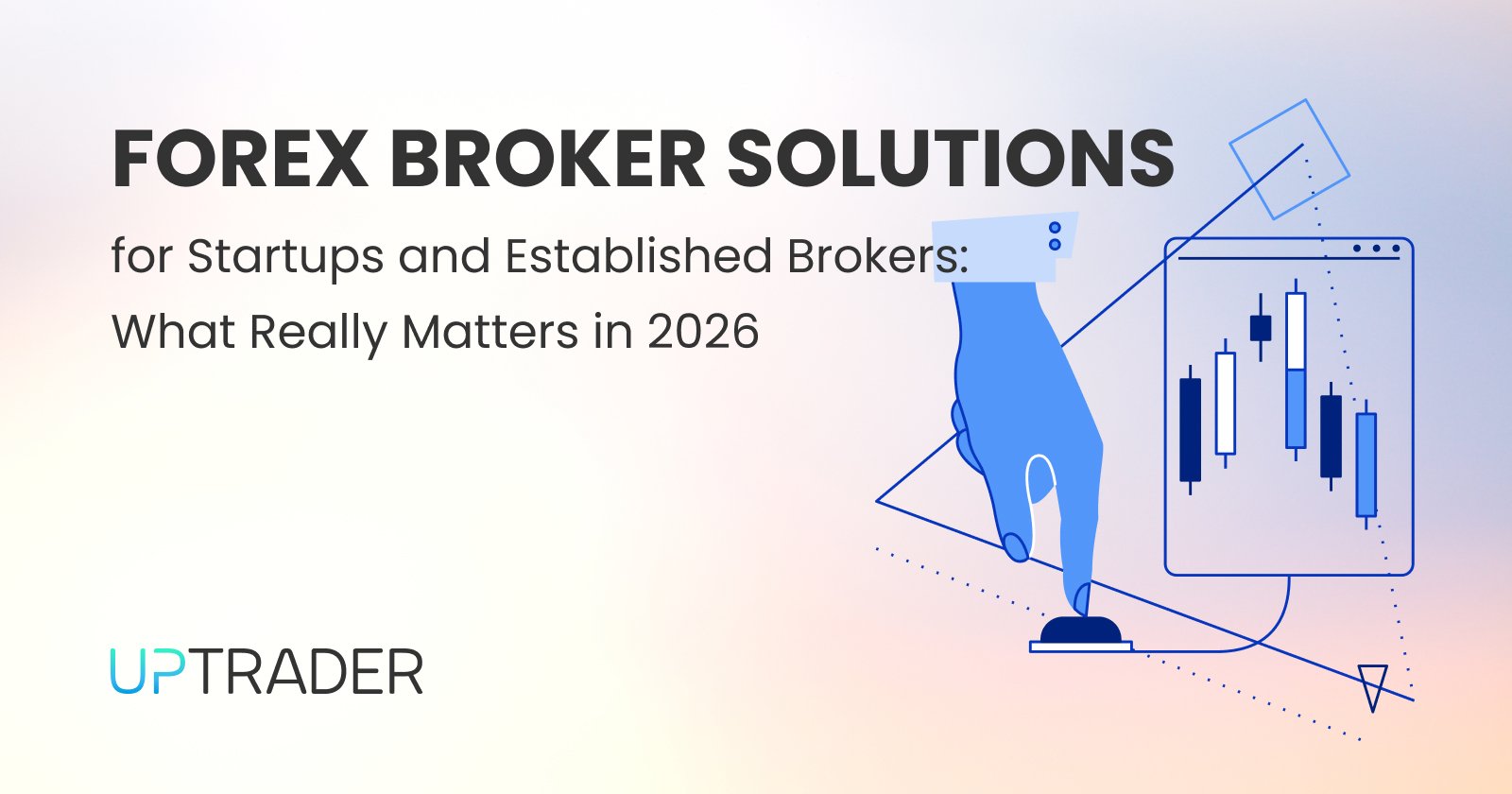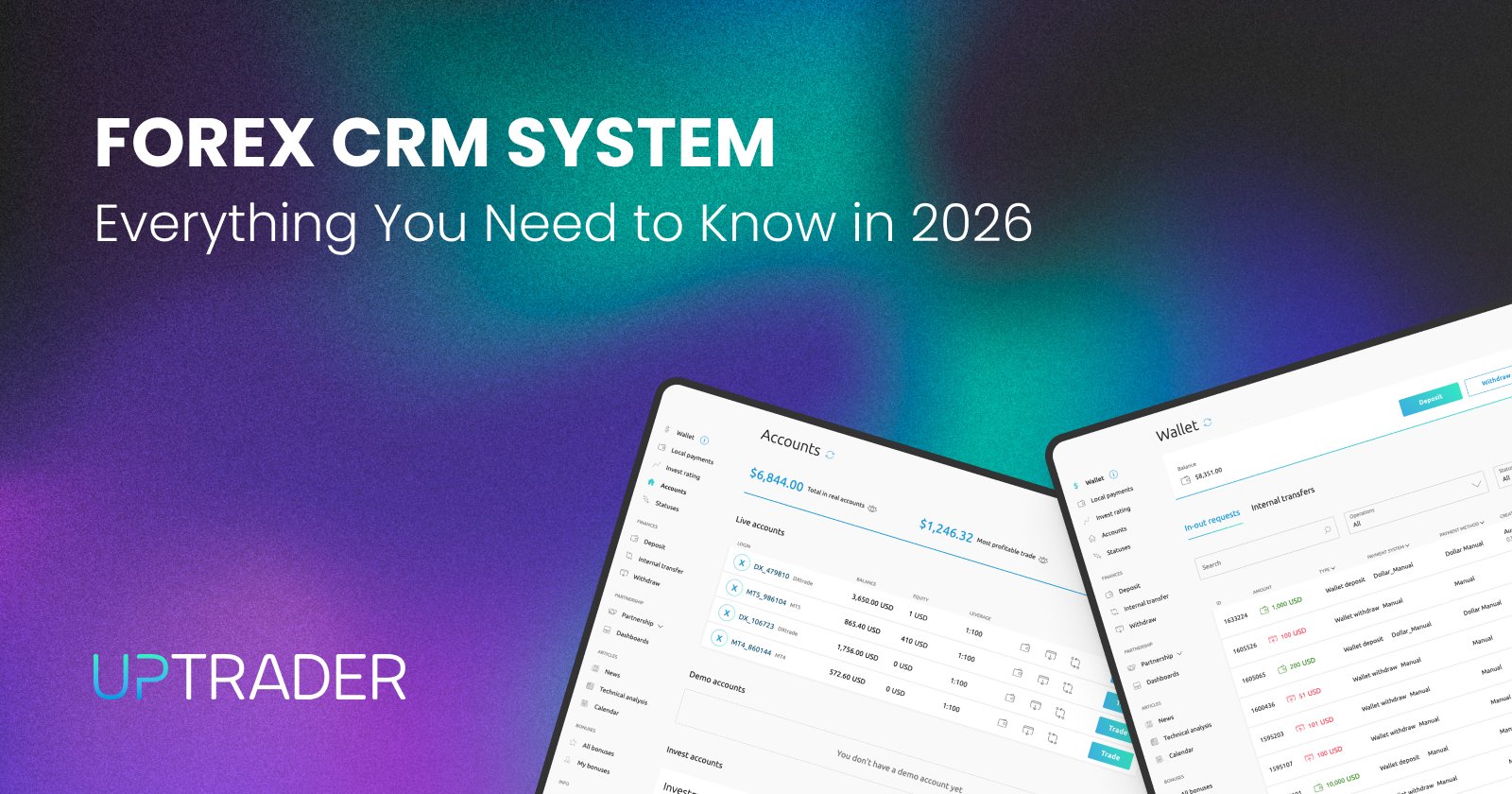Forex CRM: What is It and How Does It Benefit Your Business?

Share this publication:
In the fast-paced world of foreign exchange trading, staying ahead requires not just an understanding of the market, but also the right tools to manage client relationships efficiently. Enter Forex CRM, a bespoke solution that serves as the backbone for brokers and traders alike, ensuring seamless operations and enhanced customer interactions. As you navigate the complexities of the forex market, having the best Forex CRM by your side can make the difference between leading the pack or lagging behind. This tool isn't just about managing contacts; it's a strategic asset that can drive your business forward, highlighting the importance of choosing the right forex CRM provider.
This article delves into what Forex CRM truly is, its key features, and how it can revolutionize the way brokers interact with their clients. From exploring the elements that make up the best forex CRM systems to understanding the benefits these platforms offer, we'll guide you through implementing a forex CRM software in your business. Whether you're considering a CRM for forex brokers for the first time or looking to upgrade to a more robust fx CRM, this article will provide you with the knowledge you need to make an informed decision. Join us as we explore how integrating a top-notch Forex CRM can elevate your business operations and client satisfaction.
What is Forex CRM?
As the name suggests, a Forex CRM is a Customer Relationship Management (CRM) software designed specifically for forex brokerages. It helps brokers manage customer relationships by automating workflows and streamlining various processes. As a broker, you may contact customers for providing services, acquiring new business, marketing new products, or sales, and a Forex CRM can greatly assist with any of these activities.
Understanding CRM in Forex
A CRM system is an essential tool in any sales-related industry, including the forex market. Imagine having an Excel sheet with your customer base, but when you click on a client's name, the system displays their entire information, including all interactions from the first call to the moment they became your customer. When a client contacts you, a Forex CRM opens their history, allowing you to provide more personalized and successful offers. With this system, you can always understand what your clients need, saving time for both parties.
How Forex CRM Differs from Traditional CRM
While traditional CRMs focus primarily on customer data management and tracking sales activities, Forex CRMs leverage cloud technology to provide extended functionality, greater accessibility, and more user-friendly interfaces. These systems are designed specifically for forex brokerage companies to enhance and automate the processes of interaction with both leads and active customers.
Effective sales remain the key objective of a Forex CRM, and its importance is amplified in the forex market, where brokers fiercely compete for new clients. A well-developed Forex CRM classifies leads based on various principles and identifies the most effective marketing options, allowing business owners to focus their efforts on high-impact advertising channels. Moreover, it enables brokers to dive into the interaction process with leads and active clients, understanding their preferences and offering tailored functionality and benefits to retain traders on their platform.
Key Features of Forex CRM
As a forex broker, you need a comprehensive CRM solution that caters to the unique requirements of your business. A top-notch forex CRM offers a range of powerful features to streamline your operations and enhance client relationships. Here are some key features to look for:
Lead Identification and Management
An effective forex CRM should provide a hassle-free conversion funnel where you can track and nurture potential leads. Whether it's capturing leads, categorizing them, or following up with automation, the CRM should assist your sales team throughout the process. This feature ensures that no lead slips through the cracks, maximizing your chances of converting them into loyal clients.
Relationship Management with IBs
If you work with Introducing Brokers (IBs) and sub-IBs, your forex CRM should offer hierarchical structures to manage these partnerships effectively. This feature allows IBs to recruit and manage their own sub-IBs, expanding your client base and increasing profitability. With a multi-level IB module, you can track the performance of IBs at each level and create customized commission structures, fostering a mutually beneficial relationship.
Automation and Cost Reduction
A well-designed forex CRM automates numerous processes, reducing manual effort and associated costs. From lead nurturing and client onboarding to fund transfers and commission calculations, automation streamlines workflows and minimizes errors. This feature enables you to operate with a lean team, optimizing resources and cutting expenses without compromising on service quality.
By leveraging these key features, a forex CRM tailored to your brokerage's distinct requirements can significantly enhance your operational efficiency, client satisfaction, and overall profitability in the competitive forex industry.
How Forex CRM Benefits Brokers
As a forex broker, implementing a robust forex CRM system can revolutionize your business operations and provide a competitive edge in the dynamic forex market. Here are some key benefits you can expect:
Enhancing Customer Relations
A forex CRM acts as a centralized hub for managing client interactions, enabling you to build stronger relationships and enhance customer satisfaction. You can:
- Centralize and manage client data, including contact details, trading history, and preferences, ensuring personalized interactions.
- Track all client communications, such as emails, phone calls, and chat conversations, for seamless and efficient customer service.
- Segment clients based on various criteria like trading volume, profitability, and risk appetite, allowing you to tailor services and marketing campaigns accordingly.
- Assign tasks and set reminders for follow-ups, ensuring proactive client engagement and timely responses.
By leveraging these capabilities, you can foster trust, loyalty, and long-lasting relationships with your clients, ultimately driving business growth and success.
Efficient Data Processing
A well-designed forex CRM streamlines data processing, providing valuable insights and automating crucial tasks. You can:
- Automate trade reporting and analytics, gaining real-time insights into trading performance, profitability, and market trends.
- Generate comprehensive trade reports, including P&L statements, trade summaries, and transaction histories, for better decision-making.
- Analyze key performance indicators (KPIs) like win/loss ratio, average trade duration, and risk/reward ratios, enabling data-driven strategies.
- Monitor market trends and identify potential trading opportunities with customizable charts and indicators.
- Receive automated trade signals and alerts based on predefined criteria, improving decision-making efficiency.
By harnessing the power of data processing and analytics, you can make informed decisions, optimize your operations, and stay ahead of the competition in the ever-evolving forex market.
Implementing a Forex CRM in Your Business
Implementing a Forex CRM in your business is a strategic decision that can streamline operations, enhance customer relationships, and drive growth. To ensure a successful integration, follow these steps:
Steps to Choose the Right CRM
- Understand your business vision and goals: Outline your primary objectives and identify the features crucial for achieving them. A Forex CRM should align with your vision and support your growth trajectory.
- Evaluate reliable providers: Research reputable providers of trading CRM solutions and assess their offerings based on reviews and recommendations. Reliable providers offer package solutions tailored to your needs, seamless integration with existing systems, and robust customer support.
- Consider essential features: Look for a Forex CRM that is agnostic to trading platforms, compliant with legal norms (KYC and AML), provides easy-to-understand reports and statistics, facilitates sales management, and automates processes for time-saving efficiency.
Integration and Training
Successful implementation requires a well-planned integration and training strategy. Involve stakeholders from all levels to ensure buy-in and smooth transition. Provide comprehensive training tailored to different roles, emphasizing hands-on learning experiences and simulations. Establish clear communication channels and change management strategies to address concerns and foster a positive attitude towards the new system.
Measuring Success and ROI
Regularly assess the impact of your Forex CRM by tracking key performance indicators (KPIs) such as conversion rates, revenue growth, customer retention, and operational efficiency. Calculate the return on investment (ROI) using the formula: ROI = (Net return on investment / Cost of investment) x 100. Continuously monitor and optimize the system to maximize its value and drive business success.
By following these steps and leveraging the powerful features of a Forex CRM, you can streamline operations, enhance customer relationships, and gain a competitive edge in the dynamic forex market.
Conclusion
Throughout this exploration into the transformative power of Forex CRM systems, we've uncovered how they serve not just as tools for efficient client management but as strategic assets vital for staying competitive in the rapidly evolving forex market. By harnessing the key features of forex CRM - from lead management and relationship building to automation and data analytics - brokers can significantly enhance operational efficiency, customer satisfaction, and ultimately, their bottom line. The journey from understanding the fundamental benefits to implementing a forex CRM tailored to your brokerage's needs highlights a clear pathway toward business growth and client retention.
As we encapsulate the essential roles and benefits of adopting the right Forex CRM for your brokerage, it becomes evident that making such a strategic investment can propel your business to new heights. Whether you are at the cusp of integration or considering upgrading your existing solutions, remember that the choice of a Forex CRM provider is pivotal to unlocking potential gains. For those ready to take this crucial step, we invite you to visit our website and explore our comprehensive CRM solutions, designed to cater to your every need. Let the implementation of a superior Forex CRM be the turning point for your brokerage, paving the way for enhanced relationships, streamlined operations, and a substantial competitive advantage in the forex market.
FAQs
What exactly is a Forex CRM?
A Forex CRM is a specialized Customer Relationship Management system designed specifically for the Forex industry. It plays a crucial role in managing interactions with clients, helping brokers navigate and enhance their operations effectively.
What is CRM and how does it benefit businesses?
Customer Relationship Management (CRM) software is a tool that facilitates better interactions between businesses and their customers. It provides businesses with the necessary tools to build enduring, rewarding relationships with their clients, ensuring a personalized and exceptional customer experience.
Why should small businesses use a CRM?
Small businesses benefit from CRM software as it efficiently stores and organizes information about clients, both current and prospective. This organization leads to a more streamlined workflow, allowing businesses to manage customer data and interactions more effectively.
What value does a CRM system bring to a business?
A CRM system centralizes customer information, which enables employees to better interact with customers, anticipate their needs, and manage updates more effectively. Additionally, it aids in monitoring sales performance and achieving business goals.







